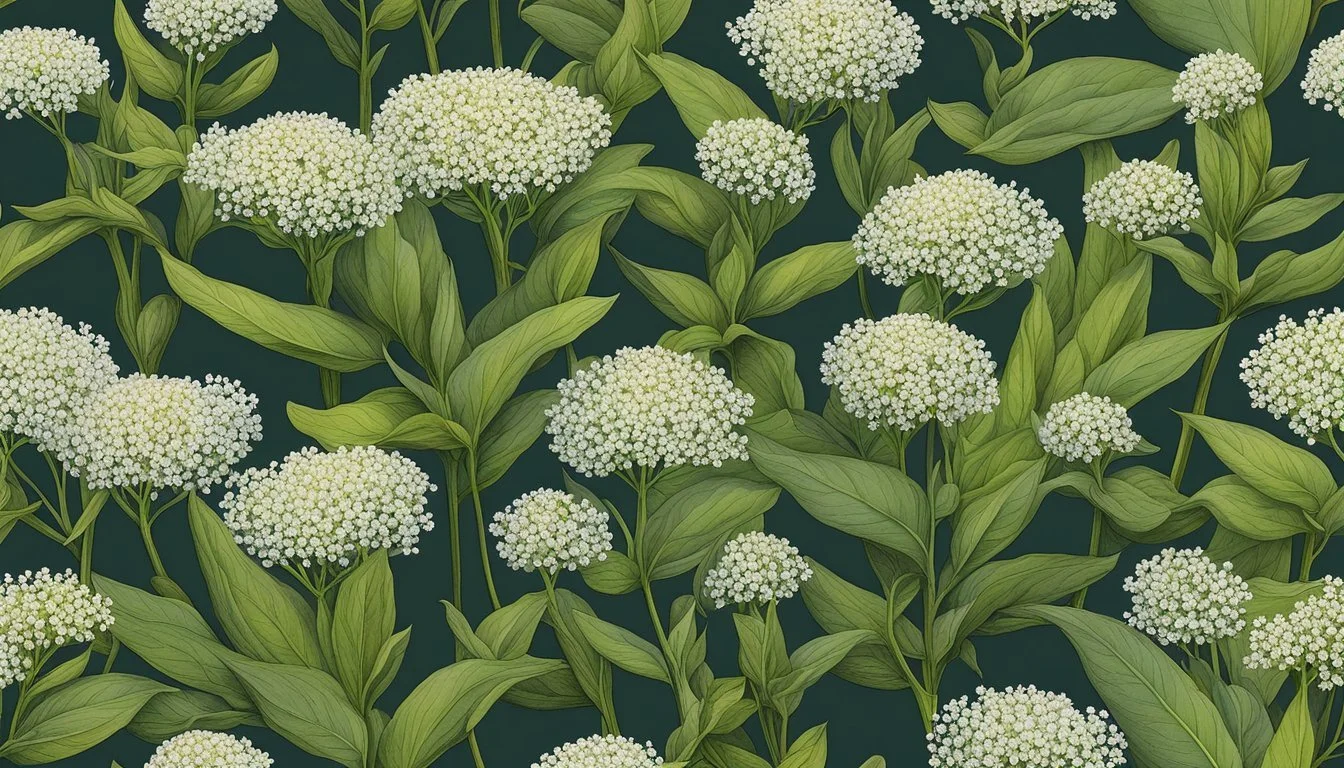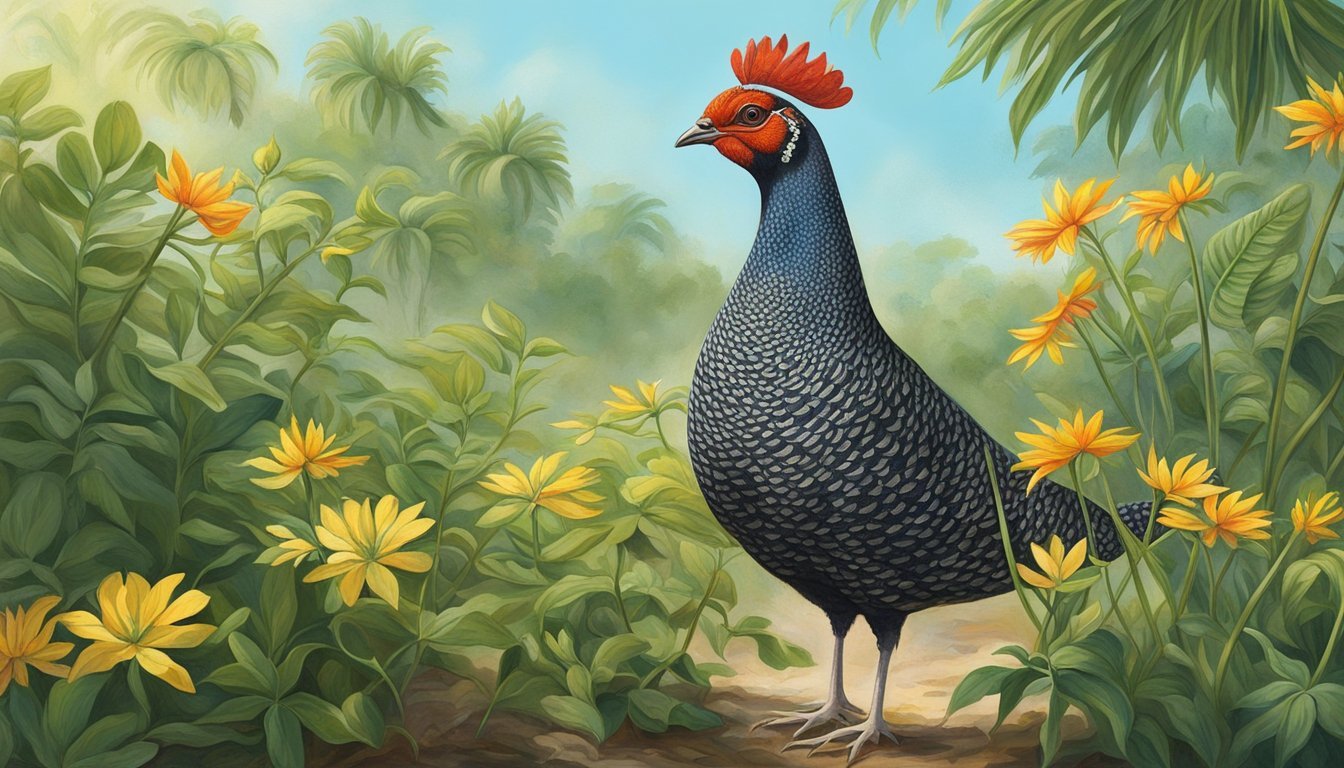Guinea Hen Weed
Unlocking the Curative Secrets of a Caribbean Marvel
Guinea Hen Weed, scientifically known as Petiveria alliacea, is a medicinal shrub native to the Amazon rainforest and the tropical areas of Central and South America, the Caribbean, and Africa. This perennial herb has been revered for centuries in various traditional medicine systems. Its reputed healing powers have made it an integral part of folk remedies, particularly in the Caribbean where it's known for its strong, garlic-like odor and a variety of health-promoting properties.
The plant's use extends from the roots to the leaves, and it grows up to approximately one meter in height. Its popularity in traditional medicine circles stems from its alleged abilities to bolster the immune system and provide relief for a range of ailments. Among the health conditions that Guinea Hen Weed is purported to address are arthritis, digestive issues, and even certain types of infections due to its anti-inflammatory and antimicrobial qualities.
Beyond its medicinal applications, the plant is also used for its culinary value in some cultures, adding a distinctive flavor to local cuisine. The interest in Guinea Hen Weed has not waned, with ongoing research investigating its potential anti-cancer properties. As such, it maintains a place as a subject of scientific study as well as a component of natural healing practices.
Origin and Historical Significance
Guinea Hen Weed, scientifically known as Petiveria alliacea, is a plant deeply rooted in the historical traditions of the Caribbean, Central, and South America. With its native ties to these regions, the plant has been featured extensively in traditional and folk medicine across these cultures.
In the Caribbean, the herb is not only a medicinal staple but has also woven its way into the culinary arts. Many Caribbean communities have relied on Petiveria alliacea for its purported therapeutic properties for generations. The plant’s applications range from treating common ailments to more complex health issues. Its historical significance is especially prominent in Jamaica, where it goes by various local names such as guinea hen weed, guinea hen leaf, and gully root.
Traditional Medicine Applications:
Pain Relief: Used for its analgesic properties to alleviate various forms of pain.
Anti-Inflammatory: Employed as a remedy for inflammation, including arthritis.
Antimicrobial: Utilized for its reported ability to fight infections.
Immune Support: Regarded as a natural booster for the immune system.
The plant is also recognized in South and Central American countries, each with its history of use and a catalog of traditional practices surrounding the herb. This ties the plant not only to a physical location but also to a rich tapestry of indigenous knowledge, where it has been valued for its potential healing powers since ancient times.
Botanical Characteristics
Guinea Hen Weed, also known by its scientific name Petiveria alliacea, possesses distinctive botanical features worth noting. The section below covers the plant's description, along with its identifying features.
Plant Description
Petiveria alliacea is a perennial herb that demonstrates both strength and resilience in its growth pattern. It typically reaches up to 1 meter in height and is familiar for its fibrous stem, which when broken, releases a distinctive garlic-like odor. This herb thrives across various landscapes, often found in tropical American environments including pastures, agricultural land, waste areas, roadsides, and riverbanks.
Identifying Features
Leaves: Petiveria alliacea displays a remarkable foliar structure. The leaves are:
Alternate in arrangement
Simple in form (not compound or divided)
Elliptical shape with a sharper focus at the end (acuminate)
Flowers: The flowers of Guinea Hen Weed are subtle yet significant:
Small and white in color
Typically grow on a stalk that may droop, displaying a delicate appearance
Stem: The herb's stem is tough and can grow up to a meter high. It's known for its robustness and for emitting a strong smell of garlic when broken.
Root: The root system has yet to be described in detail from the provided information.
Understanding these features aids in the clear identification and appreciation of Petiveria alliacea, illuminating its unique place within the plant kingdom.
Therapeutic Compounds
Guinea Hen Weed, known scientifically as Petiveria alliacea, contains a diverse array of compounds contributing to its medicinal properties.
Active Constituents
The herb's bioactive arsenal includes several key players. Notably, sulfur compounds such as dibenzyl trisulfide possess anti-cancer abilities, while also exhibiting antiviral activity, including against HIV and hepatitis C viruses. These properties are enhanced by the presence of phytochemicals that broaden the herb's therapeutic applications, from acting as an anxiolytic to serving as a neuroprotector and cognitive enhancer.
Phytochemistry
In terms of phytochemistry, Petiveria alliacea is rich in various plant compounds that are responsible for its observed health effects. The plant's anti-inflammatory properties can be attributed to flavonoids and triterpenes, known to suppress inflammatory pathways. Antimicrobial properties arise from its diverse sulfur compounds and other yet to be fully characterized lipids and fatty acids. Antioxidant properties are typical of plants rich in flavonoids and coumarins, which help to mitigate oxidative stress within the body. These phytochemicals are integral to the holistic therapeutic profile that this Caribbean herb presents.
Health Benefits and Uses
Guinea Hen Weed, known scientifically as Petiveria alliacea, has been recognized for its range of therapeutic applications. These include boosting the immune system, managing pain, exhibiting anti-inflammatory and antimicrobial properties, and showing potential in cancer treatment.
Immune Support
Guinea Hen Weed contains compounds that are believed to assist in strengthening the immune system. Regular consumption in the form of tea or tincture can be beneficial for boosting immunity to help ward off common ailments like colds.
Pain Management
The herb is traditionally used for its ability to alleviate various types of pain, including that caused by arthritis. People have reported reduced stiffness and pain with movement after using Guinea Hen Weed in preparations such as tea.
Anti-Cancer Potential
Studies suggest that Guinea Hen Weed may have anticancer properties. It seems to thwart the growth of cancer cells, although more research is needed to fully understand its efficacy in cancer treatment.
Anti-Inflammatory Effects
The anti-inflammatory qualities of Guinea Hen Weed are beneficial for those suffering from inflammatory conditions. It may also help with skin conditions and digestion due to these effects.
Antimicrobial Activity
Guinea Hen Weed demonstrates antimicrobial activity, which may make it effective against various infections. It is used to combat bacteria and viruses, indicating its use as a natural antimicrobial agent.
Other Medicinal Applications
Beyond its primary benefits, Guinea Hen Weed is also consumed for its general health advantages related to digestive issues and fever. It may also act as a blood thinner and is associated with pain relief and aiding in the treatment of diabetes.
Common Preparations
Guinea Hen Weed is commonly prepared in several forms to leverage its purported health benefits. Consistency in preparation is key to obtain its therapeutic properties.
Tea and Infusions
To make Guinea Hen Weed tea, individuals use 30 grams of the dried herb, steeped in 1 liter of boiling water for 15 minutes. The recommended dosage varies, with users typically consuming one-quarter to one-half cup of this infusion one to three times daily.
Capsules and Pills
Capsules containing ground Guinea Hen Weed are available for those who prefer a more convenient, tasteless option. The recommended dosage of the capsules depends on the concentration of the active ingredients, and one should follow the instructions provided on the product label.
Tinctures and Extracts
Tinctures allow for a concentrated form of Guinea Hen Weed and involve alcohol as a solvent to extract the active compounds. A typical dosage can range from a few drops to a full dropper, taken under the tongue or diluted in water, as advised by a healthcare provider or the manufacturer’s guidelines.
Potential Side Effects and Risks
Guinea Hen Weed, also known as Anamu, is a herb recognized for its medicinal properties. While the benefits are numerous, it is also critical to consider the potential side effects and guidelines for safe usage, particularly among pregnant women and individuals with chronic conditions.
General Health Considerations
Guinea Hen Weed may exhibit side effects including nausea, vomiting, and possible allergic reactions. It is essential for individuals to be aware of their body’s responses to new substances and to discontinue use if adverse reactions occur. The herb could also interfere with the body's blood sugar levels, necessitating caution in people with diabetes.
Impact on Specific Conditions
Pregnant women should avoid Guinea Hen Weed as it has properties that could potentially induce labor and affect pregnancy. Furthermore, those suffering from chronic diseases such as kidney or liver disorders should exercise caution due to the limited research on the herb’s long-term impact on these conditions. As it may have effects on the nervous system, individuals with existing nervous system disorders are advised to consult with a healthcare professional before use.
Guidelines for Safe Usage
To minimize risks, users are recommended to adhere to the following precautions:
Begin with a small dose and monitor your body's reaction.
Avoid using if pregnant or nursing.
Consult a healthcare provider if you have a chronic health condition or are taking other medications.
Discontinue use if you experience any adverse effects.
When using herbs like Guinea Hen Weed for relieving pain or treating coughs, individuals should not replace conventional treatment with herbal remedies without professional guidance.
Cultural Significance in the Caribbean
Guinea Hen Weed, known in the Caribbean as Anamu or by its botanical name Petiveria alliacea, holds a distinguished place in folk medicine. Throughout the Caribbean islands, herbalists revere this herb for its perceived therapeutic properties.
In these regions, Anamu is not just a plant; it epitomizes a living pharmacy. It is traditionally used for a variety of ailments, and it is common practice for Caribbean folk medicine practitioners to recommend different parts of the plant for distinct purposes.
Leaves: Traditional Use - Tea preparation
Whole herb: Traditional Use - Herbal baths
The leaves of the plant have a particular cultural significance as they sometimes are scattered around a room purportedly to ward off spirits, a practice deeply rooted in certain Caribbean belief systems. This usage highlights Anamu's role in the intangible heritage of the Caribbean people, binding the plant to both their health practices and spiritual rituals.
For the everyday herbalist, preparing a tea from the dried herb is a common way to administer the plant's perceived benefits. The herb is seeped in boiling water, then consumed to address various health complaints based on the wisdom passed down through generations.
In addition to its medicinal use, Anamu's significance also stretches into local agriculture. Livestock, particularly goats, are often found grazing on the plant, which thrives in the unique Caribbean ecosystem, growing plentifully in disturbed areas, like forest edges.
The plant's cultural footprint in the Caribbean reflects a deep trust in natural remedies and the enduring legacy of traditional herbal practices.
Modern Research and Findings
Recent scientific scrutiny has confirmed some of the traditional uses of Guinea Hen Weed (Petiveria alliacea), pointing out specific compounds that contribute to its therapeutic potential.
Studies on Anticancer Properties
Researchers have identified dibenzyl trisulfide and other sulfur-containing compounds in Guinea Hen Weed as active agents against cancer cells. These compounds demonstrate promise in inhibiting the growth of various cancers, including breast cancer, in laboratory studies. They seem to work by inducing apoptosis, which is the process of programmed cell death crucial for stopping cancer cells from multiplying.
Investigation of Antioxidant Effects
The antioxidant properties of Guinea Hen Weed have been under study with researchers isolating bioactive compounds with the potential for immune-boosting effects. These antioxidants help in neutralizing free radicals, which are harmful molecules that can lead to cellular damage and contribute to chronic diseases.
Research into Anti-Inflammatory and Antimicrobial Activities
In the realm of anti-inflammatory and antimicrobial activities, Guinea Hen Weed has revealed considerable potential. Scientific exploration has noted the plant's ability to mitigate inflammation, thus holding importance for conditions characterized by inflammatory responses. Furthermore, its antimicrobial properties have been observed against various pathogens, including Candida, a common fungal organism, suggesting anti-fungal capabilities that might offer therapeutic benefits.
Comparisons with Other Herbal Remedies
In evaluating Guinea Hen Weed, its efficacy and unique characteristics stand out, particularly when considered in the context of traditional herbal remedies.
Efficacy Compared to Similar Herbs
Guinea Hen Weed is often associated with its tea, which is a composite of traditional medicine practices in the Caribbean. Anamu, the other name for Guinea Hen Weed, exhibits similar pain relief properties to that of other natural remedies, like willow bark, often used for its salicylic acid content. While willow bark is praised for its role as a precursor to aspirin, Guinea Hen Weed's tea is traditionally consumed for similar analgesic benefits. Studies have reported users experiencing reduced pain and stiffness, which could be compared to the effects of other herbs used in joint and muscular discomfort.
Unique Characteristics
What sets Guinea Hen Weed apart from other herbs is not just its application in natural remedy circles but also the breadth of its purported benefits, sitting high on the list for its immune-boosting claims. Unlike some other herbs which might excel in a singular application, such as St. John's Wort for mood or Ginger for nausea, Guinea Hen Weed is lauded for a wide array of uses, from reported anti-cancer properties to immune system support. Its distinct alliaceous odor, due to its compound sulfur, distinguishes it in both smell and potential antimicrobial effects from its herbal counterparts.
Practical Tips for Consumers
When exploring the benefits of Guinea Hen Weed, also known as Anamu, consumers should be well-informed about selecting quality products, understanding proper dosages, and maintaining the integrity of the herb post-purchase. These tips ensure the optimal use and potential health benefits of this Caribbean herb.
Selecting Quality Products
Quality is paramount when purchasing Guinea Hen Weed supplements or teas. Consumers should look for products that provide:
Source Information: The origin should be clearly stated, with a preference for regions known for high-quality herbs.
Purity Confirmation: Check for a label that certifies the absence of pesticides and artificial additives.
Recommended Dosages and Methods of Consumption
To harness the medicinal properties of Guinea Hen Weed without overuse, one should follow these guidelines:
Teas: For making tea, approximately 30 grams of dried Guinea Hen Weed can be seeped in 1 liter of boiling water for 15 minutes. It is generally recommended to drink between one-quarter and one-half cup, one to three times daily.
Supplements: If taking as a supplement, it's crucial to adhere to the manufacturer's recommended dosage, as this may vary between products.
Post-Purchase Storage and Handling
Proper storage enhances the longevity and efficacy of Guinea Hen Weed:
Teas: Store dried herbs or tea products in a cool, dark place, ideally in air-tight containers to preserve their aroma and medicinal properties.
Supplements: Keep capsules or tablets in their original packaging, away from moisture and direct sunlight.
By maintaining the quality and integrity of Guinea Hen Weed products, consumers can make informed choices that support their health, particularly in areas like immunity and memory.
Future Perspectives in Herbal Medicine
With the global herbal medicine market projected to expand significantly, the future appears promising for herbs like Guinea Hen Weed (Petiveria alliacea). This particular herb is indigenous to the Caribbean and has garnered attention for its potential anticancer properties. Researchers are examining how bioactive compounds within the plant may affect cancer cells, and their findings could influence future cancer therapies.
The growing market reflects a trend towards natural remedies, with a CAGR of ~7.2% from 2017 to 2023. Within this context, Guinea Hen Weed stands out not only for its anticancer potential but also its immune-boosting qualities. These characteristics suggest that the herb might play a role in both preventive health measures and as an adjunct to conventional cancer treatments.
Anticancer Potential: Researchers are exploring how Guinea Hen Weed disrupts cancer cell growth.
Immune Boosting: The herb may strengthen the body's natural defenses.
Future research must focus on clinical trials to establish the efficacy and safety of such herbal remedies. Amid these trends, there is an opportunity for herbal medicine to complement traditional therapies, adapting to patient needs and scientific advancements.








